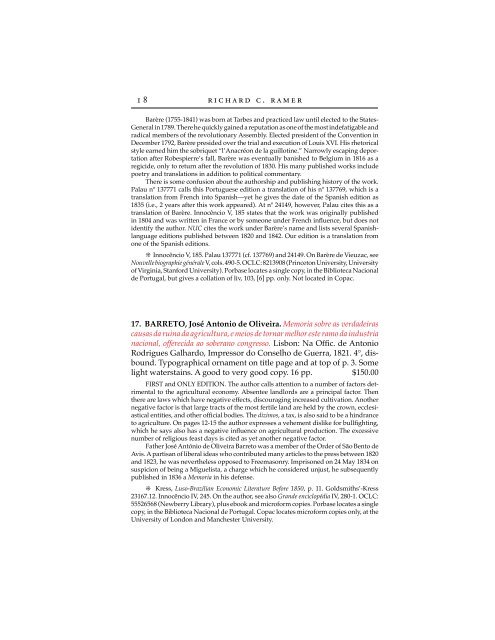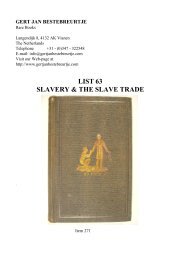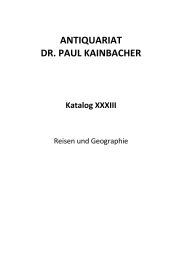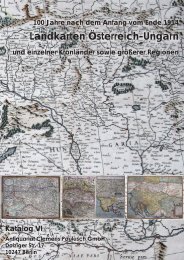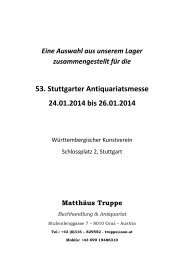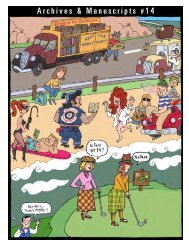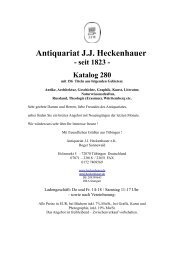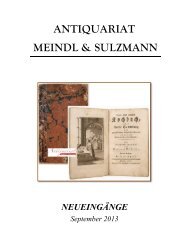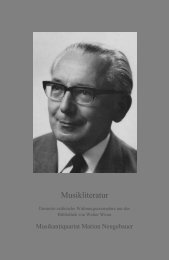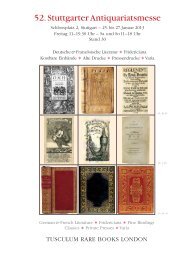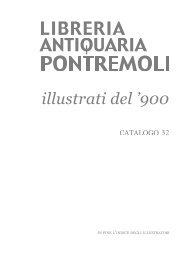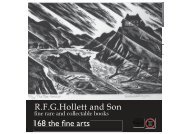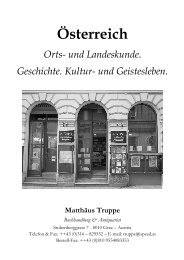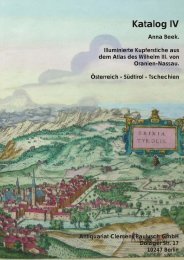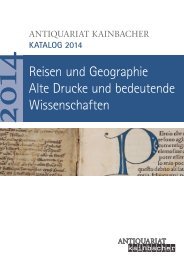Recent Acquisitions - Richard C. Ramer Old & Rare Books
Recent Acquisitions - Richard C. Ramer Old & Rare Books
Recent Acquisitions - Richard C. Ramer Old & Rare Books
Create successful ePaper yourself
Turn your PDF publications into a flip-book with our unique Google optimized e-Paper software.
18<br />
richard c. ramer<br />
Barère (1755-1841) was born at Tarbes and practiced law until elected to the States-<br />
General in 1789. There he quickly gained a reputation as one of the most indefatigable and<br />
radical members of the revolutionary Assembly. Elected president of the Convention in<br />
December 1792, Barère presided over the trial and execution of Louis XVI. His rhetorical<br />
style earned him the sobriquet “l’Anacréon de la guillotine.” Narrowly escaping deportation<br />
after Robespierre’s fall, Barère was eventually banished to Belgium in 1816 as a<br />
regicide, only to return after the revolution of 1830. His many published works include<br />
poetry and translations in addition to political commentary.<br />
There is some confusion about the authorship and publishing history of the work.<br />
Palau nº 137771 calls this Portuguese edition a translation of his nº 137769, which is a<br />
translation from French into Spanish—yet he gives the date of the Spanish edition as<br />
1835 (i.e., 2 years after this work appeared). At nº 24149, however, Palau cites this as a<br />
translation of Barère. Innocêncio V, 185 states that the work was originally published<br />
in 1804 and was written in France or by someone under French influence, but does not<br />
identify the author. NUC cites the work under Barère’s name and lists several Spanishlanguage<br />
editions published between 1820 and 1842. Our edition is a translation from<br />
one of the Spanish editions.<br />
j Innocêncio V, 185. Palau 137771 (cf. 137769) and 24149. On Barère de Vieuzac, see<br />
Nouvelle biographie générale V, cols. 490-5. OCLC: 8213908 (Princeton University, University<br />
of Virginia, Stanford University). Porbase locates a single copy, in the Biblioteca Nacional<br />
de Portugal, but gives a collation of liv, 103, [6] pp. only. Not located in Copac.<br />
17. BARRETO, José Antonio de Oliveira. Memoria sobre as verdadeiras<br />
causas da ruina da agricultura, e meios de tornar melhor este ramo da industria<br />
nacional, offerecida ao soberano congresso. Lisbon: Na Offic. de Antonio<br />
Rodrigues Galhardo, Impressor do Conselho de Guerra, 1821. 4°, disbound.<br />
Typographical ornament on title page and at top of p. 3. Some<br />
light waterstains. A good to very good copy. 16 pp. $150.00<br />
FIRST and ONLY EDITION. The author calls attention to a number of factors detrimental<br />
to the agricultural economy. Absentee landlords are a principal factor. Then<br />
there are laws which have negative effects, discouraging increased cultivation. Another<br />
negative factor is that large tracts of the most fertile land are held by the crown, ecclesiastical<br />
entities, and other official bodies. The dizimos, a tax, is also said to be a hindrance<br />
to agriculture. On pages 12-15 the author expresses a vehement dislike for bullfighting,<br />
which he says also has a negative influence on agricultural production. The excessive<br />
number of religious feast days is cited as yet another negative factor.<br />
Father José António de Oliveira Barreto was a member of the Order of São Bento de<br />
Avis. A partisan of liberal ideas who contributed many articles to the press between 1820<br />
and 1823, he was nevertheless opposed to Freemasonry. Imprisoned on 24 May 1834 on<br />
suspicion of being a Miguelista, a charge which he considered unjust, he subsequently<br />
published in 1836 a Memoria in his defense.<br />
j Kress, Luso-Brazilian Economic Literature Before 1850, p. 11. Goldsmiths’-Kress<br />
23167.12. Innocêncio IV, 245. On the author, see also Grande enciclopédia IV, 280-1. OCLC:<br />
55526568 (Newberry Library), plus ebook and microform copies. Porbase locates a single<br />
copy, in the Biblioteca Nacional de Portugal. Copac locates microform copies only, at the<br />
University of London and Manchester University.


